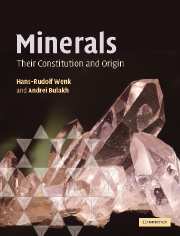Book contents
- Frontmatter
- Contents
- Preface
- Acknowledgments
- Figure credits
- Part I Structural features of minerals
- Part II Physical investigation of minerals
- Part III Variety of minerals and mineral-forming processes
- Part IV A systematic look at mineral groups
- Part V Applied mineralogy
- 30 Metalliferous mineral deposits
- 31 Gemstones
- 32 Cement minerals
- 33 Minerals and human health
- 34 Mineral composition of the solar system
- 35 Mineral composition of the earth
- Appendices
- Glossary
- References
- Index
- Plate section
- References
34 - Mineral composition of the solar system
from Part V - Applied mineralogy
- Frontmatter
- Contents
- Preface
- Acknowledgments
- Figure credits
- Part I Structural features of minerals
- Part II Physical investigation of minerals
- Part III Variety of minerals and mineral-forming processes
- Part IV A systematic look at mineral groups
- Part V Applied mineralogy
- 30 Metalliferous mineral deposits
- 31 Gemstones
- 32 Cement minerals
- 33 Minerals and human health
- 34 Mineral composition of the solar system
- 35 Mineral composition of the earth
- Appendices
- Glossary
- References
- Index
- Plate section
- References
Summary
Elements in the universe
According to current theory, the universe began about 13.7 billion years ago during a primordial explosion referred to as the “Big Bang”. Shortly after the Big Bang, the first elements were formed, primarily helium and hydrogen (minor amounts of other light elements, such as deuterium, tritium, lithium, beryllium and boron, also formed during this event). As the expanding universe continued to cool, areas of higher density matter, or protogalaxies, began to condense. As these early galaxies evolved, gravitational attraction between elements within the galaxies led to regions that collapsed under great pressure, triggering exothermic nuclear fusion reactions that resulted in the formation of the first stars. The nuclear reactions in the core of stars produce elements of light and intermediate weight (up to iron and nickel), with the mass of a particular star determining just what elements may form during the course of its lifetime. Our sun is a relatively nondescript star of the “yellow dwarf” type; there are over one billion such dwarfs in our galaxy alone. In small stars such as the sun, helium, carbon, oxygen, neon, and magnesium may form. In larger, more massive stars, however, heavier elements can synthesize, all the way up to iron. Magnesium, silicon, and iron are the main elements produced in these stars, comprising less than 1% of the universe.
- Type
- Chapter
- Information
- MineralsTheir Constitution and Origin, pp. 570 - 585Publisher: Cambridge University PressPrint publication year: 2004



